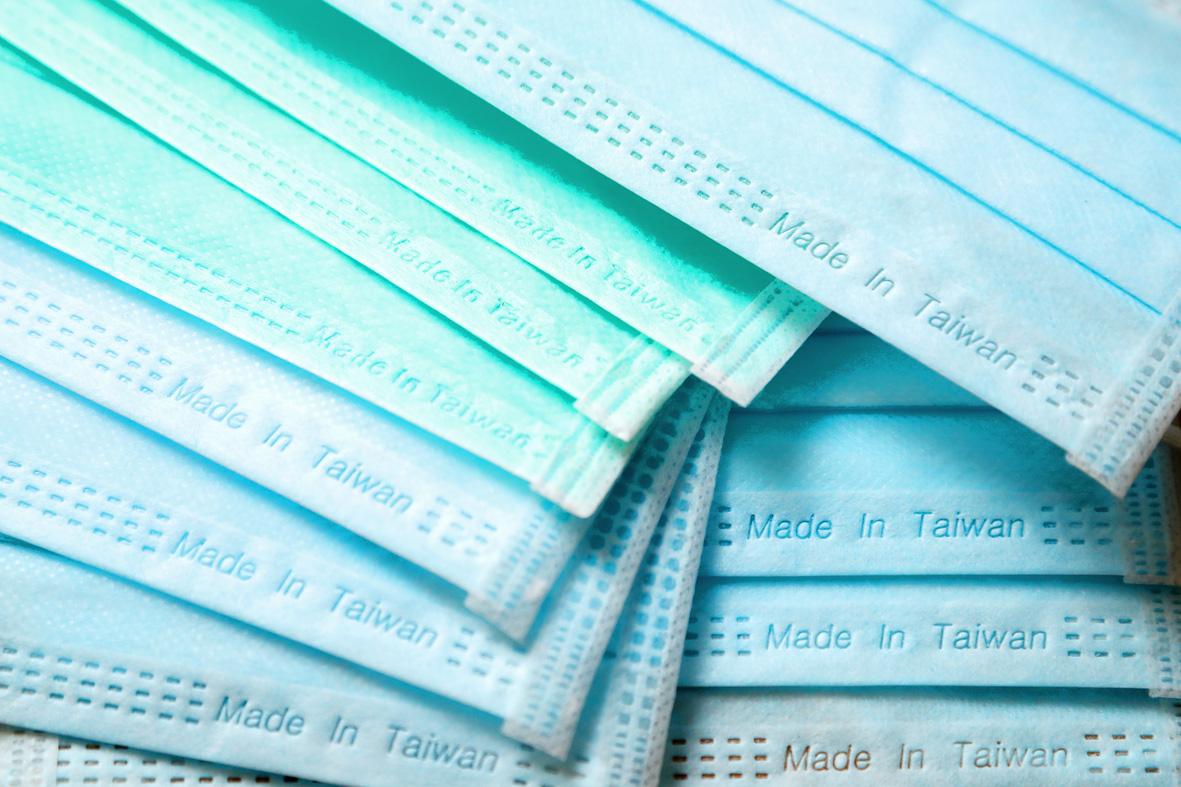People will be allowed to send up to 30 masks to family members abroad from Thursday next week, the Central Epidemic Command Center (CECC) said yesterday as it announced an easing of restrictions, including to allow people to buy up to nine adult masks or 10 children’s masks every two weeks.
Minister of Health and Welfare Chen Shih-chung (陳時中), who heads the center, said that as domestic mask production has begun to meet demand, the restrictions were eased on mask purchases using National Health Insurance (NHI) or Alien Resident Certificate cards.
People will be allowed to send up to 30 adult masks, or about two months’ supply, to first or second-degree relatives living in other countries per mail package every two months, he said.

Photo: CNA
Taiwanese living abroad with NHI cards can preorder masks online and ask family members to collect and send them, or people in Taiwan can share their own masks, Chen said.
While there is a mask shortage in many other countries, the CECC encourages people not to waste them just because they are allowed to purchase more starting next week, he said.
“From April 9, for people’s convenience, the limit for buying children’s masks will be changed from five masks per seven days to 10 masks per 14 days, meaning people can buy the maximum amount for two weeks in one visit,” Chen said.
“The change to the rules on purchases of adult masks is proportionally greater, with the three-mask-per-seven-days limit rising to nine per 14 days,” he said.
The rules dictating which days cardholders can buy masks would be removed, meaning people would be allowed to purchase them on any day, but only one type of mask — those for adults or for children — could be bought at a time, he said.

Taiwan has received more than US$70 million in royalties as of the end of last year from developing the F-16V jet as countries worldwide purchase or upgrade to this popular model, government and military officials said on Saturday. Taiwan funded the development of the F-16V jet and ended up the sole investor as other countries withdrew from the program. Now the F-16V is increasingly popular and countries must pay Taiwan a percentage in royalties when they purchase new F-16V aircraft or upgrade older F-16 models. The next five years are expected to be the peak for these royalties, with Taiwan potentially earning

STAY IN YOUR LANE: As the US and Israel attack Iran, the ministry has warned China not to overstep by including Taiwanese citizens in its evacuation orders The Ministry of Foreign Affairs (MOFA) yesterday rebuked a statement by China’s embassy in Israel that it would evacuate Taiwanese holders of Chinese travel documents from Israel amid the latter’s escalating conflict with Iran. Tensions have risen across the Middle East in the wake of US and Israeli airstrikes on Iran beginning Saturday. China subsequently issued an evacuation notice for its citizens. In a news release, the Chinese embassy in Israel said holders of “Taiwan compatriot permits (台胞證)” issued to Taiwanese nationals by Chinese authorities for travel to China — could register for evacuation to Egypt. In Taipei, the ministry yesterday said Taiwan

Taiwan is awaiting official notification from the US regarding the status of the Agreement on Reciprocal Trade (ART) after the US Supreme Court ruled US President Donald Trump's global tariffs unconstitutional. Speaking to reporters before a legislative hearing today, Premier Cho Jung-tai (卓榮泰) said that Taiwan's negotiation team remains focused on ensuring that the bilateral trade deal remains intact despite the legal challenge to Trump's tariff policy. "The US has pledged to notify its trade partners once the subsequent administrative and legal processes are finalized, and that certainly includes Taiwan," Cho said when asked about opposition parties’ doubts that the ART was

If China chose to invade Taiwan tomorrow, it would only have to sever three undersea fiber-optic cable clusters to cause a data blackout, Jason Hsu (許毓仁), a senior fellow at the Hudson Institute and former Chinese Nationalist Party (KMT) legislator, told a US security panel yesterday. In a Taiwan contingency, cable disruption would be one of the earliest preinvasion actions and the signal that escalation had begun, he said, adding that Taiwan’s current cable repair capabilities are insufficient. The US-China Economic and Security Review Commission (USCC) yesterday held a hearing on US-China Competition Under the Sea, with Hsu speaking on